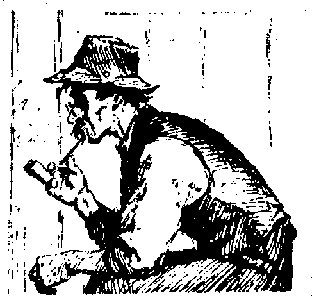
There was a morning fog almost every day last week and the outside air seemed to be cloying with dampness, a situation confounded by the sudden breakdown of the air conditioner in the General Store.
Cityfella walked in on a damp Friday waving a letter he had just received from his sister Tosca, who had a condo in a large development outside of Burnsville, known publicly as Hill-Top Heaven but privately as Grandiose Manor. When he stopped to sip his just provided coffee, Fella (whose proper name was Forest) began reading from his sister’s latest email that he had printed out so he was able to read it to the assembled throng.
“Dear Forest (he began), it’s started again, you know that ubiquitous fog, the all-consuming early-morning mist that ruins golf shots, outdoor selfies, and not only local shopping but even regional forays down below. Just this morning our windows looked out on that pearly mist covering our little piece of heaven, which is part of the newly-restored salute to elegant mountain living called Hill-Top Heaven. (Fella’s aside: These were mini-estates carved from the Asheville holdings of Grover Clampert, a man who made his money in the first Florida real-estate wars of 1892).
“You will remember (Fella continued reading the letter) that my husband Phillip promised we would all adjust to the climate here. After all, we’re only in Asheville one month a year, then it’s on to Greece, Madrid, London, Peru, and our own beloved LA.”
“Thank God for that,” interjected Fella, as he stirred his freshly-brewed coffee. The paper cup helped to dry his damp hand as it held the General Store’s latest import of tastefully refined coffee, delivered from one of the great new Asheville grocery stores. This one was from Farmer Oscar’s Peruvian Import Shop, especially known for their expensive but artfully designed cups cast in the shape of a deadly amanita mushroom, one of Oscar’s little jokes.
Fella continued to read the letter aloud. “Forest, we are, after all, fortunate to be at home here in our precious condo, not only because of our wonderful home but for the fly-casting pond and the Labyrinth, all those meandering footpaths, the waterfalls, the woods, and our beloved koi pond.”
“That’s true,” Fella said as he set aside the letter and spooned more twice-filtered fresh cane sugar into the coffee, “but having been up to her condo and visited their Labyrinth, I do wonder about that dressed-up monster that works daily in the center of the maze and preaches that drivel about redemption and Mother Crete.”
“Do your sister and husband work at all?” asked Mrs. Storekeep.
Cityfella thought for a moment then said, “My sister stopped working when she found—and married—Phillip, and he hasn’t worked since this last big property windfall when his art gallery in Atlanta was standing in the way of downtown street expansion and he made a killing selling the air rights to the city.
“Surely, that wasn’t enough to support their present life style—or was it?” asked Curmudgeon, who up to now had sat silently in the rear of the store’s postal area.
“Phillip took that money,” said Cityfella, “then invested it into some kind of a phantom hotel expansion scheme in Asheville. Following up that profit with more money that came from buying stock in Duke Energy, and now they have enough, it seems, for all their worldly wants.”
“We all should work,” said Mrs. Storekeep in her often quite voice.
At that moment, Cityfella’s wife, Doreen, walked into the store, looking great in her smashing outfit made from imported wool collected in the Ecuadorian Mountains and loomed in that charming little shop in Biltmore Village.
“Forest,” she said to her husband, “we just got a call from Tosca, in a panic because Phillip appears to have run off to Miami with a waitress who works at a trendy restaurant in Madison County, and now she’s destitute. So come along, we are off to console her.”
Suddenly, Forest was consumed with a desperate love for his wife Tosca, and setting his cup down on the desk next to the store’s post office, reached for her hand (almost cutting his finger on the 20-karet faux-emerald she wore, which was imported from a jeweler on the north side of Greensboro). Taking her hand in his, they rushed out the front door and drove off in the direction of Burnsville.
Silence reined in the General Store until Mrs. Storekeep muttered in a low tone: “If only that ubiquitous fog would fade away.”
Peter Loewer has written and illustrated more than twenty-five books on natural history over the past thirty years.
